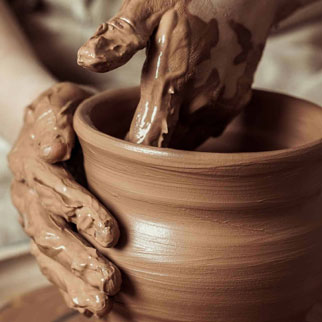
“But now, O Lord, you are our Father; we are the clay, and you are our potter; we are all the work of your hand. Be not so terribly angry, O Lord, and remember not iniquity forever. Behold, please look, we are all your people" (Isaiah 64:8-9 , ESV).
John Donne (1572-1631), was a poet and writer who wrote, "No man is an island, entire of itself; every man is a piece of the continent, a part of the main... Any man's death diminishes me because I am involved in mankind; and therefore never send to know for whom the bell tolls; it tolls for thee."
The opening words from another one of Donne's poems rattles around in my head from time to time. It is an intensely emotional and personal poem, full of strong and intimate language; a poem that is the raw outpouring of a man's heart longing after his God. It is also a clear expression of his own weakness, sinfulness, and need for "mending" in the most potent sense. There's a chorus that goes "Break me, melt me, mold me, shape me..." It's the same sentiment Donne is expressing, just not in such a raw, transparent manner.
Reading the poem, if you listen carefully, you can hear echoes of David's brokenness before the Lord (How long, O LORD, how long?, Psalm 13), as well as Paul's gut-wrenching admission that he does what he does not want to do, and does not what he should (Romans 7). Yet, as so many others, both of them moved resolutely forward in their faith and trust, no matter what. So did John Donne.
Here is Donne's poem. The title is the same as the first line:
Batter my heart, three-person'd God; for you
As yet but knock; breathe, shine, and seek to mend;
That I may rise, and stand, o'erthrow me, and bend
Your force, to break, blow, burn, and make me new.
I, like an usurp'd town, to another due,
Labour to admit you, but O, to no end.
Reason, your viceroy in me, me should defend,
But is captived, and proves weak or untrue.
Yet dearly I love you, and would be loved fain,
But am betroth'd unto your enemy;
Divorce me, untie, or break that knot again,
Take me to you, imprison me, for I,
Except you enthrall me, never shall be free,
Nor ever chaste, except you ravish me.
If the heart of the poem's meaning seems elusive because of the language, then get a clear picture in your mind of a potter shaping clay. The clay is pummeled, smacked, poked, whacked, and squeezed hard before the less violent, even gentle shaping takes place.
I don't know how it is for you, but for me, it's really easy to sing sweet-sounding choruses and declare smugly, "Oh Lord, make me more like You. Oh yes, oh yes."
But then the words of John Donne or a particularly anguished Psalm comes to mind and suddenly saccharine promise-box platitudes fall flat. The reality of the struggle, and my role in it, hits home.
Taking on true Christlikeness can be painful and wrenching, but it is well worth the price, since the price He paid is so much greater.
Write a Comment
Comments for this post have been disabled.